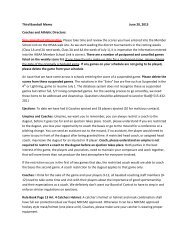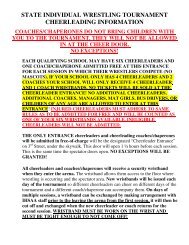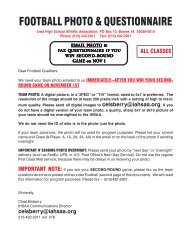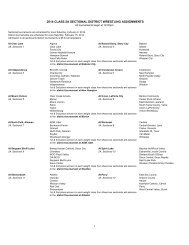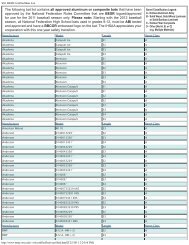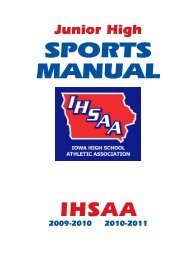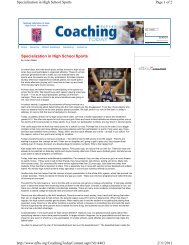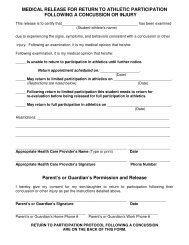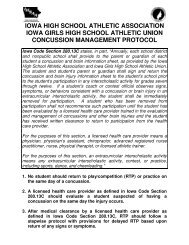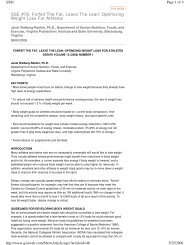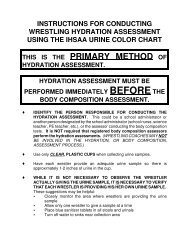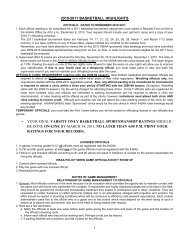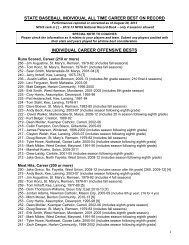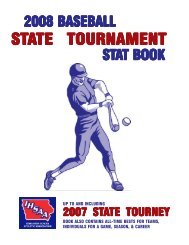Scorer Instructions and Duties
Scorer Instructions and Duties
Scorer Instructions and Duties
You also want an ePaper? Increase the reach of your titles
YUMPU automatically turns print PDFs into web optimized ePapers that Google loves.
INSTRUCTIONS TO AND DUTIES OF THE TIMER<br />
FOR BASKETBALL GAMES<br />
RULES COVERAGE:<br />
Rule 2-4-2: The referee shall designate the official timepiece <strong>and</strong> its<br />
operator.<br />
Rule 2-12: <strong>Duties</strong> <strong>and</strong> responsibilities of the timer are indicated. An<br />
efficient timer will carefully study these sections <strong>and</strong> become thoroughly<br />
familiar with all their aspects. The timer shall sound a warning<br />
signal 15 seconds before the expiration of an intermission, a time-out<br />
(60- or 30-second) <strong>and</strong> the 20-second interval to replace a disqualified,<br />
injured or player directed to leave the game. The timer shall also signal<br />
when the time has expired for an intermission, a charged time-out or a<br />
replacement interval.<br />
EQUIPMENT:<br />
Electric clock timer <strong>and</strong> one stopwatch, or a table-clock timer <strong>and</strong> one<br />
or two stopwatches. A gong, loud siren or electric air horn to signal the<br />
end of playing time. When present, a red/LED light is permitted to end<br />
a quarter or extra period; otherwise, the audible signal ends the quarter<br />
or extra period.<br />
BEFORE THE GAME:<br />
1. The official timer should ascertain the game starting time <strong>and</strong><br />
suggest that the referee <strong>and</strong> coaches synchronize their watches.<br />
2. Review the official signals for starting the clock, time-out, a foul<br />
or violation.<br />
3. Notify the scorer 10 minutes prior to the starting time.<br />
TIMING REGULATIONS:<br />
1. Playing time shall be:<br />
a. For teens of high school age — four quarters of eight minutes<br />
each with intermissions of one minute after the first <strong>and</strong> third<br />
quarters <strong>and</strong> 10 minutes between halves. Halftime may be<br />
extended to a maximum of 15 minutes upon proper notification.<br />
b. For teams younger than in (a) — four quarters of six minutes<br />
each with intermissions same as for (a).<br />
2. Overtime Play:<br />
a. If the score is tied at the end of the second half, play shall<br />
continue without change of baskets for one or more extra<br />
periods, with a one-minute intermission before each.<br />
b. The length of each extra period shall be four minutes (or half<br />
the time of a regulation quarter for non-varsity contests).<br />
c. As many such extra periods as are needed to break the tie shall<br />
be played. Game ends, if, at end of any extra period, the score<br />
is not tied.<br />
d. Extra periods are an extension of the fourth quarter.<br />
3. A time-out charged to a team is of either 60-seconds or 30-second<br />
duration unless both teams are ready to resume play sooner.<br />
4. No time-out is charged to a team when:<br />
a. The floor official grants a player’s request because of displaced<br />
eyeglasses or lens.<br />
b. A correctable error as in 2-10, or a timing, scoring or alternating<br />
possession mistake has been prevented or rectified.<br />
5. The sounding of the scorer’s signal or game horn does not cause<br />
the game timepiece to be stopped.<br />
START THE OFFICIAL TIMEPIECE WHEN:<br />
1. A tossed ball is legally tapped when play is started by a jump.<br />
2. The ball touches a player on the court during a throw-in (if clock<br />
has been stopped).<br />
3. An official signals “start the clock.” If he or she neglects to do so,<br />
the official timepiece should be started unless an official specifically<br />
signals that it should not be started.<br />
4. The ball touches or is touched by a player on the court provided<br />
the ball is to remain live if the free throw is missed. In these cases,<br />
the official will give the start-the-clock signal, but if he or she<br />
neglects to do so, the official timepiece should be started when it<br />
is apparent the ball touches a player <strong>and</strong> is to remain live.<br />
STOP THE OFFICIAL TIMEPIECE WHEN:<br />
1. Any period ends.<br />
2. An official gives a time-out signal. The official will order time-out<br />
when:<br />
a. A foul is called by holding h<strong>and</strong> with fingers closed at arm’s<br />
length above head.<br />
b. A jump/held ball is declared by giving the jump-ball signal<br />
(holding thumbs up at shoulder height away from body <strong>and</strong><br />
motioning upward with both arms extended).<br />
c. A violation occurs by giving the time-out signal (holding h<strong>and</strong><br />
with fingers extended at arm’s length above head) after which<br />
the proper violation signal is given.<br />
d. There is to be a charged time-out, or an official’s time-out for a<br />
technical foul, or other stoppage indicated by a floor official<br />
who holds a h<strong>and</strong> at arm’s length above the head with fingers<br />
extended.<br />
NEAR THE END OF PLAYING TIME:<br />
1. If a watch is being used as the official timepiece, place it so that<br />
the timer may see it <strong>and</strong> the ball. The watch must be stopped the<br />
instant the signal ending the game is sounded.<br />
2. When a timing device other than a watch is the official timepiece,<br />
the timer must assist in determining the position of the ball when<br />
time expires.<br />
3. Some timers, in order to avoid misunderst<strong>and</strong>ing concerning the<br />
position of the ball when time expires, have one person watch the<br />
official timepiece <strong>and</strong> count aloud 10 - 9 - 8 - 7, etc., while another<br />
person watches the ball <strong>and</strong> notes its position at the exact<br />
moment time expires.<br />
4. If a quarter or extra period ends <strong>and</strong>:<br />
a. The timer has been unable to make an official hear the signal,<br />
the timer must immediately notify the official.<br />
b. The timing signal fails or is not heard by an official, the timer<br />
must be prepared to advise the referee as to whether the ball<br />
was in flight when time expired, or whether a foul occurred<br />
before or after the period had ended.<br />
c. The timing signal is not heard by the officials, testimony of the<br />
timer may determine whether a score shall count or a foul shall<br />
be charged, unless the referee has information which would<br />
alter the situation.<br />
2010



